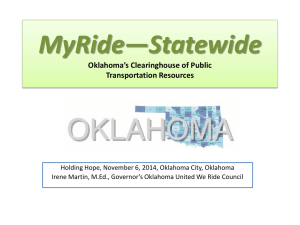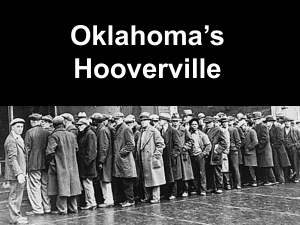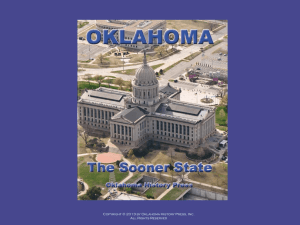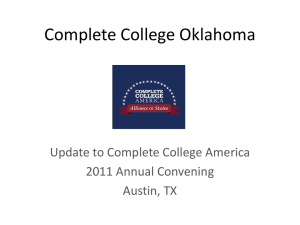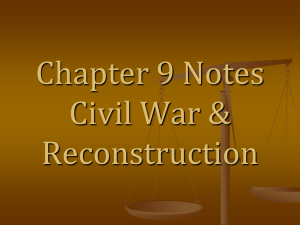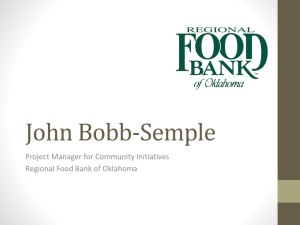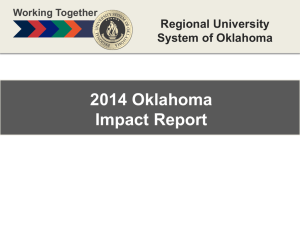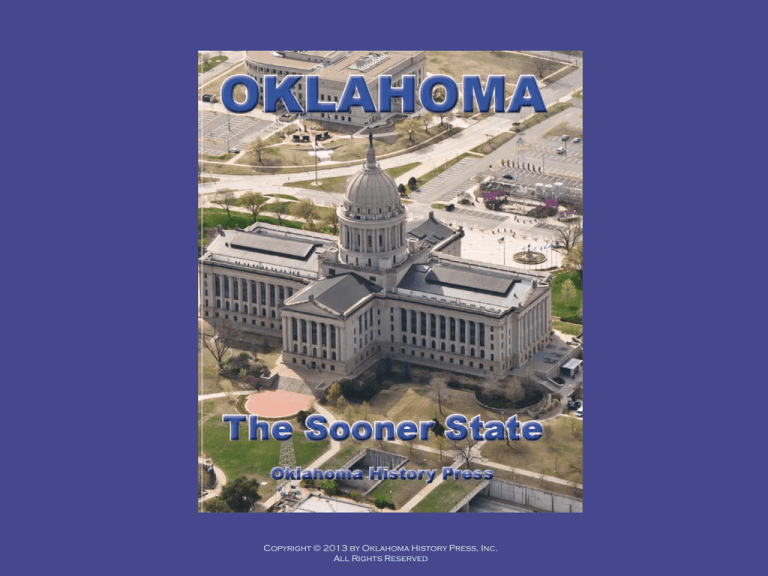
Copyright © 2013 by Oklahoma History Press, Inc.
All Rights Reserved
Unit
3
Settlement
The Osage Trade by Oklahoma Artist Charles Banks Wilson.
Copyright © 2013 by Oklahoma History Press, Inc.
All Rights Reserved
Chapter 9
Civil War and Reconstruction
Indian Territory Before the War
Farms and Plantations
Slavery in the Territory
Gopher John
Slave Rebellion
Abandoned in Indian Territory
Confederate Interests
Indian Sympathies with the South
Copyright © 2013 by Oklahoma History Press, Inc.
All Rights Reserved
Chapter 9
Civil War and Reconstruction
Tribal Divisions Over Alliances
The Cherokees
The Creeks
Battle of Round Mountain
Refugees
Destroying the Territory
Battle of Honey Springs
Copyright © 2013 by Oklahoma History Press, Inc.
All Rights Reserved
Chapter 9
Civil War and Reconstruction
Western Indians in the War
Ross Joins the Union
General Stand Watie
End of the War
Negotiating the Reconstruction Treaties
Conditions of the Treaties
Railroads and Public Grants
Copyright © 2013 by Oklahoma History Press, Inc.
All Rights Reserved
DISCUSSION QUESTIONS
1. What role did geography play in the alignment of Indian
Territory with the South in the Civil War?
2. What were the major reasons why Indian Territory joined with
the Confederacy?
3. How did the tribes settle into a society similar to that of the
Old South?
4. How did the Seminoles differ from the Cherokee in their
attitude toward slavery?
5. Tell about the slave rebellion in 1842.
Copyright © 2013 by Oklahoma History Press, Inc.
All Rights Reserved
DISCUSSION QUESTIONS
6. How was the Cherokee leadership divided over the issue of
taking sides during the Civil War?
7. Why was the Confederacy interested in Indian Territory?
8. What actions did the Plains Indian Tribes take in taking sides
during the Civil War?
9. How did Reconstruction affect Indian Territory?
10. Discuss the role of John Ross in the Civil War as it was
conducted in Indian Territory.
Copyright © 2013 by Oklahoma History Press, Inc.
All Rights Reserved
Rose Cottage, the home of Chief John Ross in Park Hill, was burned
by General Stand Watie on October 28, 1862.
Copyright © 2013 by Oklahoma History Press, Inc.
All Rights Reserved
Indian recruits are sworn into the Army
during the Civil War.
Copyright © 2013 by Oklahoma History Press, Inc.
All Rights Reserved
The Cherokee delegation to Washington, D. C., in 1866 included John Rollin Ridge,
Saladin Watie, Richard Field, E. C. Boudinot, and W. P. Adair.
Copyright © 2013 by Oklahoma History Press, Inc.
All Rights Reserved
Confederate agent Albert Pike signed treaties with the Choctaws, Chickasaws, Seminoles
and Creeks in 1861. All three tribes agreed to support the Confederacy.
Copyright © 2013 by Oklahoma History Press, Inc.
All Rights Reserved
General Stand Watie
Copyright © 2013 by Oklahoma History Press, Inc.
All Rights Reserved
Cherokee Chief John Ross and his second wife Mary B. (Stapler) Ross.
Copyright © 2013 by Oklahoma History Press, Inc.
All Rights Reserved
Copyright © 2013 by Oklahoma History Press, Inc.
All Rights Reserved
Copyright © 2013 by Oklahoma History Press, Inc.
All Rights Reserved

